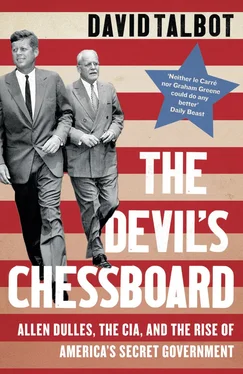Dulles seemed a guest in his own family home—amiable but detached. It was clear to his daughter Joan that “ his life was somewhere else.”
“My father was a benign figure at home,” she remembered. “He was friendly, but he was clearly not interested in us … I don’t remember any anger. He never scolded us when we weren’t doing well enough in school, or asked us how we were doing.”
The one time Joan saw her father cry was after he heard on the radio about the fall of France to Hitler’s troops. She watched this rare display of emotion with “astonishment” as her father wept in his library. But she had no idea why this dramatic bulletin—among everything else in his eventful life—had so profound an effect on him. He never discussed politics or world events at home, even though it was the fuel of his career. “At breakfast he would have the New York Times and I wouldn’t be able to tell you anything about his attitude toward anything. He’d be buried in the newspaper.”
There’s a “price,” Joan added, for this sort of emotional anesthesia in a family, for never “talking in the home about your life and your politics and what’s going on”—about anything that truly matters. “I think it’s devastating.”
Dulles carefully insulated Clover from his life. He would fly off to distant locations at a moment’s notice and not tell her where he was going or for how long. It had nothing to do with intelligence protocol, insisted Joan. “It was just the way he operated.”
Mary felt that Dulles kept his professional life from Clover because he was afraid that she was too morally sensitive and would disapprove of his undercover work. But he seldom showed much of a protective instinct toward his wife. Dulles would fill his letters home to Clover with references to his many dalliances and infatuations with other women. The life he evoked in this correspondence was filled with beautiful countesses and expertly mixed cocktails, and was certain only to cruelly reinforce Clover’s domestic confinement.
Eleanor Dulles once remarked on the difference between her two brothers. Foster, who was inseparable from his own wife, Janet, would go out of his way to help anyone in the family who was in distress. The pious older brother would even secure an abortionist—in his day, not an easy or legal task—if it came to that, she said. “As for Allen,” added Eleanor, “when anyone was in trouble, Allen seemed always to be off somewhere, lying under a palm, getting himself fanned.”
Clover tried to keep the distress of her marriage from her children. Despite her husband’s frequent absences—and his constant social demands when he was home—she ran the family households in Manhattan and Long Island with calm efficiency. She took pains to compensate for his emotional shortcomings. In a letter she wrote Joan in February 1945, soon after reuniting with Allen in Bern, she tried to put his extreme self-absorption in the best possible light for their daughter. By then, Dulles had been away from home for over two years, during which time he had no contact with his children as they navigated their way through adolescence.
“ Dad asked for newsof you both very especially—[you] and Allen—and your coming of age,” Clover wrote. “Otherwise it would not be possible for you to imagine how engrossed he is in his work, and how he neither thinks, speaks or asks of anything else. There is no doubt he is different from most but I do believe that he does everything that he does, not only because he likes it, but as a way of showing his affection for us, paying us the compliment of believing that what we want is for him to do something worthwhile in the world. Everyone here adores him and he has done incalculable good.”
But many years later, Clover would write a more honest assessment of her husband in a diary that she left for her children. By then, she felt no obligation to window-dress their marriage. “ My husband doesn’t converse with me, not that he doesn’t talk to me about his business , but that he doesn’t talk about anything … It took me a long time to realize that when he talks it is only for the purpose of obtaining something … He talks easily with men who can give him some information, and puts himself out with women whom he doesn’t know to tell all sorts of interesting things. He has either to be making someone admire him, or to be receiving some information worth his while; otherwise he gives one the impression that he doesn’t talk because the person isn’t worth talking to.”
It was Clover’s curse to spend her life with such a man, and it was Allen’s to live with a woman who was finally able to understand him.
Near the end of the war, Clover went to great lengths to rejoin Allen in Switzerland, pulling every available string to acquire the visas and travel permits necessary for an American citizen to venture into war-torn Europe. At last, after hearing that the U.S. embassy in newly liberated Paris had ordered a shipment of official cars, she finagled an assignment as one of the drivers. After a rough ocean crossing, Clover disembarked in Lisbon and joined the convoy as it took an arduous course through Portugal and Spanish Basque country, crossing the Pyrenees into France, where she and the other dozen drivers came under the protection of French resistance fighters. It took a full week for the drivers to complete their painstaking journey to Paris. When the exhausted Clover delivered her vehicle to the American embassy, she was relieved to hear that her husband was also in Paris—but he installed her at a different hotel and kept her waiting for two full days before finally greeting her.
When he appeared in her hotel room, Dulles brusquely informed her that he could spare only ten minutes. He told her to meet him early the next morning at his own hotel to begin their automobile journey to Switzerland. Then, without making any effort to cushion the blow, he announced that her mother had died while Clover was crossing the Atlantic. And with that, he disappeared again, leaving her to mourn alone.
“ My wife is an angel,” Dulles told Mary soon after meeting her. “She’s always doing things for other people.” But that is not the way Allen generally made Clover feel. After Clover began treatment with Jolande Jacobi, the analyst encouraged her artistically inclined patient to begin expressing her inner turmoil in drawings. In one picture, Clover drew herself as acrying, forlorn donkey. That’s the way she felt, she explained to Mary—like a weepy ass—whenever Allen was rushing around, “engaged in activities [Clover] didn’t understand but suspected were not as important as his behavior implied.”
When Dulles shifted his operations to Germany in the postwar period, Clover moved to Zurich so that she could work more closely with Jacobi. It was an intense, therapeutic relationship that Clover kept going long after she returned to the United States, returning to Switzerland on numerous occasions for prolonged visits. While visiting the United States, Jacobi would stay at the Dulles home in Washington. What Jacobi did for her suffering patient “was nothing short of a miracle,” Clover later wrote. After each of her Swiss sessions, Clover would hurry to a Zurich café to jot down the insights she had unearthed with Jacobi. The treatment, she wrote at the time, filled her with a new self-confidence. Clover began to feel “liberated from the feeling that my husband’s way of looking at things is the right way or has any particular glamour or reason attached to it.”
The journals that Clover kept during her analysis are mercilessly introspective—wrenching cries from the darkest depths of her soul. Some of the journals were devoted to meticulous accounts of her dreams, which revealed the misery of her marriage as well as a vibrant but stifled erotic imagination. In one dream, which she recorded in her journal in November 1945, Clover was suffering from a terrible physical trauma, but Allen was completely oblivious to her pain. “ My whole stomach had collapsed, or been cut open or cut in two … [But] it was a great satisfaction, a sort of triumph even, a justification to myself that all the time there actually had been something seriously the matter with me, a proof that instead of making a big fuss about nothing, as my husband thought, I actually had made comparatively little out of a really big affliction.”
Читать дальше











